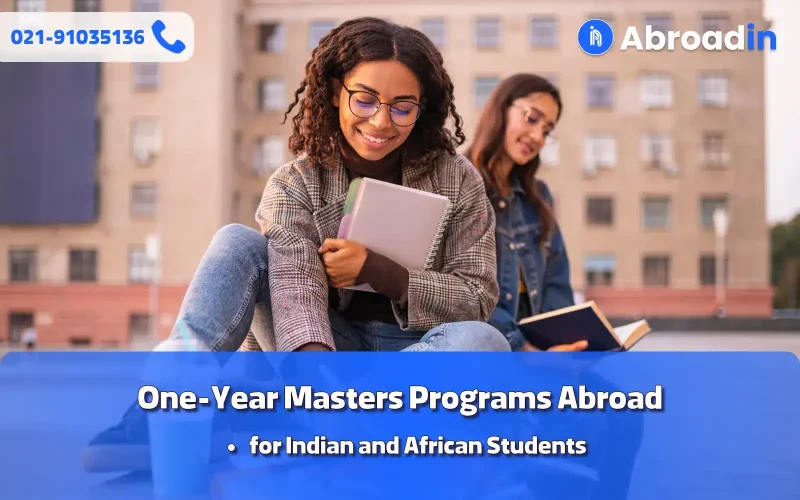

Why One-Year Masters Programs for International Students?
One-year masters programs provide focused education quickly. They are for applicants who want to save time and money.
These programs offer a fast track to global careers for Indian and African students. Compared to longer programs, they also reduce living expenses.
Short programs help students start their careers sooner. They require less time away from work or family. This issue is vital for students from countries where financial constraints are typical.
One-year programs also lower total expenses. Students pay for only one year of tuition and living costs. Many countries also offer scholarships to reduce financial burdens.
In addition, having a master’s degree from a European university boosts chance of employment. Employers value international experience and skills gained abroad.
Indian and African students gain exposure to many industries and networks, preparing them for competitive job markets in their home countries or globally.
Additionally, studying abroad develops soft skills like adaptability and communication, which are valuable and practical in any career.
International students return home with a global perspective, making them attractive to employers. This experience sets them apart in competitive job markets.
What are Top Countries for Affordable Master’s Programs?
Many European countries have affordable education systems with high standards. That is why international students from lower-income countries seek to apply in countries like Germany, France, Poland, and Lithuania.
These nations also provide English-taught programs, making them suitable for non-native speakers. Below are some suggestions for one-year masters programs available.
Germany: Tuition-Free Master’s Programs
Most master’s programs in Germany last two years, but some private universities offer one-year masters programs too.
Public universities charge only a small administrative fee, around €300–€400 per semester. These options make Germany highly affordable for international students.
Private universities offer one-year programs such as MBAs. These programs cost €5,000–€10,000 per semester but provide quick graduation.
The following is a list of German universities offering one-year Masters programs to students seeking efficient, high-quality education:
- Technical University of Munich (TUM): Engineering, Computer Science, Business, Natural Sciences
- University of Mannheim: Accounting, Finance, Management, Economics
- Humboldt University of Berlin: Computer Science, Economics, Political Science, Mathematics
- University of Stuttgart: Aerospace Engineering, Electrical Engineering, Sustainable Management
- University of Cologne: Business Administration, Economics, Finance, Management
Living expenses for a single person in Germany are approximately €800 to €1,100 per month, not including rent. On average, Germany’s cost of living is 1.6% less than the US.
There are also many scholarships in Germany. These are some guides on available financial aid around the world.
France: Low Tuition Master’s Programs
France has always been an attractive destination for Indian and African applicants. This country offers low tuition fees at public universities, between €170 and €650 per year.
Some private institutions provide one-year masters programs, especially in business field. These programs cost around €15,000 but offer quality education.
The following is a list of French universities offering one-year Masters programs across diverse disciplines:
- INSEAD: Global MBA, Business Administration, Finance
- ESSEC Business School: Global MBA, Management, Marketing, Sustainability
- HEC Paris: MBA, Business Administration, Strategic Management
- Université Paris-Saclay: Risk and Resilience Engineering, Management, Sciences
- ESLSCA Business School Paris: MBA, Finance, Trading Room Skills
Living costs in France range from €700 to €950 per month. International students, including those from India and African nations, can access English-taught programs.
France’s post-study work visa, up to 24 months, supports graduates seeking jobs. So, France is considered a strong option for affordable, quick education.
Poland: Budget-Friendly Master’s Programs
Public universities charge tuition fees of €1,000 to €2,000 per year, which is affordable to most Indian and African students.
Poland’s low living costs range from €300 to €700 per month. Some institutions offer one-year MBAs costing around €10,000.
These are some Polish universities offering one-year Masters programs for international applicants:
- University of Warsaw: International Relations, Data Science, Economics, Psychology
- Jagiellonian University: European Studies, Environmental Management, Business
- Kozminski University: Finance and Accounting, Management, International Business
- Cracow University of Economics: Financial Accounting, Economic Analytics
- Wroclaw Business University: International MBA, Business Management
English-taught programs are widely available in Poland, and international students from India and Africa can study without language barriers.
Poland also offers post-study work visas of up to 12 months, allowing graduates to seek related jobs or start personal businesses.
If you are seeking European visas, read this Abroadin article about age requirements for university admission and student visas in Europe.
Lithuania: Affordable Master’s Programs
Lithuania is a lesser-known but budget-friendly destination for international students. Living costs in this European country are low, ranging from €200 to €380 per month outside major cities.
Public universities charge tuition fees of €1,150 to €5,000 per year. Some, like Vilnius University, offer one-year MBAs costing around €3,000.
The following is a list of Lithuanian universities offering one-year Masters programs in different fields and disciplines:
- Vilnius University: Strategic Economics, Business Strategy, Media and Journalism
- ISM University of Management and Economics: Innovation and Technology Management, Business
- Vilnius Gediminas Technical University (VILNIUS TECH): Sustainability Management, Environmental Engineering
- Kaunas University of Technology (KTU): Electronics Engineering, Mechatronics, Data Science
- Mykolas Romeris University (MRU): Social Sciences, Interdisciplinary Research, Law
English-taught programs make Lithuania accessible for non-native speakers.
Post-study work visas of up to nine months allow students to explore job prospects. This is a practical guide for international students on finding a job in Europe after graduation.
Scholarships for Indian and African Students
Scholarships are a big part of studying abroad for students from India and African nations, where financial constraints are typical.
Many European countries offer funding for international students, covering tuition, living costs, and sometimes travel expenses.
These are some popular scholarship opportunities for one-year or affordable master’s programs:
- DAAD Scholarships Germany: These provide €992 per month for master’s students, covering living costs, travel, and health insurance.
- Erasmus+ (Europe-wide): This program offers stipends for travel, visas, and living expenses, supporting students in countries like France, Poland, and Lithuania.
- French Embassy Scholarships: These fund Indian and African students in France, covering tuition and living costs.
- Polish Government Scholarships: These are available for international students, and they reduce tuition and living expenses in Poland.
- Lithuanian Government Scholarships: These support students with stipends for tuition and living costs, making Lithuania affordable.
Applying for scholarships requires early preparation. Students should check eligibility, submit strong applications, and meet deadlines.
Many countries offer post-study work visas, too, allowing students to stay and seek employment.
Germany, France, Poland, and Lithuania provide favorable visa policies too:
- Germany offers an 18-month post-study work visa, which allows graduates to find jobs related to their field of study.
- France provides up to 24 months, giving ample time to secure employment.
- Poland has 12-month visa for career quests.
- Lithuania has 9-month visa for shorter job searches.

Challenges of One-Year Masters Programs
One-year masters programs are good options for international students to continue their higher studies, yet they come with challenges.
The most current ones include higher fees at private institutions, intensive coursework, and language requirements. Let’s take a closer look at them:
Higher Costs at Private Universities
Private universities often offer one-year programs, which charge higher tuition fees. For example, in Germany, a one-year MBA at private institutions like Munich Business School may cost €32,000.
In contrast, public universities offer two-year programs with no tuition fees. Students must weigh the cost against the benefit of quick graduation.
Intensive Academic Workload
One-year programs condense coursework into a short period. It requires strong time management and focus.
Indian and African students may find the pace challenging, especially adapting to new education systems. Proper planning and study habits can help manage this intensity.
Language and Admission Requirements
While many programs are taught in English, some require proficiency tests like TOEFL or IELTS.
These tests add costs and preparation time. Students should verify language requirements early and prepare accordingly.
How to Choose the Right Program?
Choosing the right master’s program requires careful research and planning. Indian and African students should consider their budget, career goals, and academic interests.
The following strategies can guide their decision-making process:
- Research Public Universities: Focus on countries like Germany, where public universities offer free or low-cost education. Two-year programs at these institutions are often more affordable than one-year private programs.
- Apply for Scholarships Early: Identify scholarships like DAAD, Erasmus+, or country-specific funds. Submit applications well before deadlines to secure funding.
- Check English-Taught Programs: Ensure the program is taught in English to avoid language barriers. Most universities in Germany, France, Poland, and Lithuania offer such options.
- Evaluate Post-Study Work Options: To boost career prospects, choose countries with favorable work visas, like Germany (18 months) or France (24 months).
- Compare Costs and Duration: Balance the benefits of one-year programs against the affordability of two-year programs. Public universities often provide better value.
How to Prepare for Study Abroad?
Studying abroad requires detailed planning to meet academic, financial, and visa requirements. International students must start this process early to avoid common delays.
If you are wondering where to start, take a look at these key steps of the process:
1. Research and Application Process
Start with universities and programs that fit your ambitions. Scrutinize admission rules — transcripts, recommendation letters, test scores.
Apply early, hitting deadlines — 6 to 12 months pre-program. Always scour official university and scholarship websites for fresh, detailed data.
2. Visa and Financial Planning
Apply for a student visa as soon as you receive admission. Each country has specific requirements, such as proof of funds or health insurance.
Budget for tuition, living costs, and travel expenses. Scholarships or part-time work can help manage finances during studies.
3. Securing Scholarships and Funding
Scholarships unlock education’s gates for cash-strapped students. Options like DAAD for Germany, Erasmus+ for Europe, or niche grants in France, Poland, and Lithuania
For getting scholarships you should prepare complete applications — transcripts, essays, recommendation letters. Early submissions beat the crush, boosting the odds of funding.
4. Cultural and Academic Adaptation
Adapting to a new country and education system can be challenging. Indian and African students should learn about local cultures and academic expectations.
Many colleges and universities offer orientation programs to help international students adjust better. Engaging with student communities also eases the transition.
Conclusion
One-year masters programs abroad provide Indian and African students a path to excellent education and global careers. Countries like Germany, France, Poland, and Lithuania have affordable options with scholarships and post-study work opportunities.
If you are serious about seizing opportunities to study abroad, consult with Abroadin experts. They all have gone through the same path to study, grow, and explore Europe. Abroadin also has some practical admission packages you can use to go through this route faster.
References
https://gostudyin.com/india/study-in-uk/study-options/postgraduate-and-masters-degree/
https://www.educations.com/masters-degrees/africa/combined
https://ielts.idp.com/mauritius/about/news-and-articles/article-one-year-masters-programs-in-usa
FAQ
Here are the most frequently asked questions about the top study abroad consultants for Indian students:
European countries like Germany, France, Poland, and Lithuania provide low-cost one-year programs. Tuition ranges from €170–€10,000, ideal for students aiming to study and work abroad.
Poland’s One-year masters programs cost €1,000–€10,000 annually. They are budget-friendly for Indian and African students seeking to study and work in Europe.
DAAD scholarships offer €992 monthly for a one-year master’s, supporting Indian and African students. These scholarships cover tuition and living costs to facilitate studying and working.
France’s 24-month post-study work visa allows graduates of one-year masters programs to seek jobs. This offers Indian and African students ample time to study and work in European countries.
Lithuania’s one-year masters programs are intensive. Accomplishing them requires strong time management. However, they are affordable for Indian and African students at €1,150–€5,000.
For downloading PDF of the article fill the form


How useful was this post?
Click on a star to rate it!
Average rating 5 / 5. Vote count: 1
No votes so far! Be the first to rate this post.








No comment yet, add your voice below!